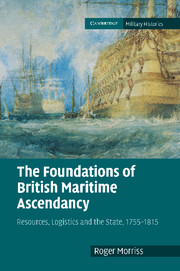Book contents
- Frontmatter
- Contents
- List of tables
- Preface
- Glossary of British weights, measures, casks and money values
- List of abbreviations
- Introduction
- 1 The British state in evolution
- 2 Defence and expansion
- 3 Economy and finance
- 4 Naval growth and infrastructure
- 5 Ordnance and technology
- 6 Manpower and motivation
- 7 Foodstuffs and victualling
- 8 Shipping and transportation
- 9 The supply of land forces overseas
- Conclusion
- Bibliography
- Index
1 - The British state in evolution
Published online by Cambridge University Press: 10 January 2011
- Frontmatter
- Contents
- List of tables
- Preface
- Glossary of British weights, measures, casks and money values
- List of abbreviations
- Introduction
- 1 The British state in evolution
- 2 Defence and expansion
- 3 Economy and finance
- 4 Naval growth and infrastructure
- 5 Ordnance and technology
- 6 Manpower and motivation
- 7 Foodstuffs and victualling
- 8 Shipping and transportation
- 9 The supply of land forces overseas
- Conclusion
- Bibliography
- Index
Summary
During the second half of the eighteenth century the power of the British state grew. It drew that strength from within from those who wielded power locally and in commerce. Driven by war, the state grew and developed efficient forms of managing innovation and change. Ideas about the efficiency of organisation shifted, with a view to the production of greater motivation among its servants. Management of the state's resources was placed in the hands of men open to new thinking, and ready to consult those with expert knowledge. With competition, resources were always in short supply, but policy towards them was equally concerned with the removal of obstacles to existing sources as with enlargement of the resource base. State law reflected this reduction of restrictions, but was balanced by the growing framework in law and policy of equity between the state and its servants in the private sector, whether small-scale contractors or great commercial companies. Ideas, management, policy and law all shaped the logistics of state supply. They made for a state which could summon, control, organise and provide resources for its armed forces throughout the globe.
The British state
The structure, culture and capabilities of the British state developed during the second half of the eighteenth century. Its growing power was reflected in the perceptions of its leading economic critics.
- Type
- Chapter
- Information
- The Foundations of British Maritime AscendancyResources, Logistics and the State, 1755–1815, pp. 7 - 32Publisher: Cambridge University PressPrint publication year: 2010

